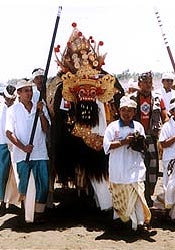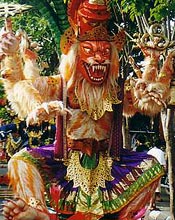|
 |
| Home
> All
About Bali > Calendar
> Nyepi |
| |
| Nyepi |
| |
 |
|
| |
| Nyepi Day, The Day of Absolute
Silence |
| |
On Thursday, 30 March 2006, Hindu
people in Bali commemorate the Nyepi Day (Saka
New Year 1928), the day of absolute silence
for Hindu people. Nyepi is derived from the word
'sepi' which means silent.
Since the world is considered clean in the beginning
of the year, the Balinese people celebrate the coming
of the New Year with meditation instead of partying.
On Nyepi Day, all Hindu people must do four customs
of implementation the Nyepi Day (Catur
Brata Penyepian). There should not be fire
(amati geni) nor works
or activities to do (amati
karya). People won't be allowed to have fun
(amati lelanguan) nor
to travel (amati lelungan).
These prohibitions are intended to control themselves
and surrender to God.
During Nyepi Day, which begins at sunrise and continues
for the next twenty-four hours, people have to stay
in their own houses. There will be no lights in
the house, no sounds of radio or television, and
no works. It is absolutely silence. The entire Bali
is just like a deserted island during the day.
Visitors to Bali definitely need to be aware of
Nyepi Day, as they will not be able to go anywhere
on this day. All the flights at the International
Ngurah Rai Airport, harbor and other kinds of transportation
are closed all day long. Lights in public areas,
corridors and balconies will be switched off. All
recreational places will be temporarily closed.
Before and after Nyepi Day, there are a few ceremonies
need to be done by Balinese people, as follows:
|
| |
Melasti
 Three days before Nyepi is called Melasti, a purification
ceremony, when the villagers purify the statues
(pratima) with water.
The ceremony is meant to clean all nature and its
content, and also to take the Amerta (the
source for eternal life) from the ocean or
other water resources.
Three days before Nyepi is called Melasti, a purification
ceremony, when the villagers purify the statues
(pratima) with water.
The ceremony is meant to clean all nature and its
content, and also to take the Amerta (the
source for eternal life) from the ocean or
other water resources.
These are days when the villagers, dressed in their
finest, walk in lines towards a holy spring, river,
or the sea. In this procession, the women carry
offerings of fruits, sweet cakes, and flowers, and
the men carry long-poled umbrellas and carry the
sacred family statues on bamboo litters. Water is
used to wash the statues, and holy men sacrifice
pigs, to be used as offerings to the Gods. |
| |
Tawur Kesanga
One day before Nyepi is called Tawur Kesanga which
means to purify Buana Agung (macro
cosmos) and Bhuana Alit (micro
cosmos) as well as neutralize  negative
power from evil spirits. negative
power from evil spirits.
Tawur Kesanga ceremony usually begins with Ogoh-Ogoh
parade. Ogoh-Ogoh is a giant bamboo statue with
fangs, bulging eyes and scary hair to symbolize
evil spirits (Bhuta Kalla).
The Ogoh-Ogoh parades are held all over Bali after
sunset, accompanied by Bleganjur, a Balinese gamelan
music.
In the evening, the Balinese people celebrate Ngerupuk,
when they start making noises and light burning
torches and set fire to the Ogoh-Ogoh in order to
get the evil spirits out of people’s lives. |
| |
| Nyepi |
On Nyepi Day, there is no transportation,
no fires may be lit, no work is done and no one
should be seen on the roads. Silence is important
so that the evil spirits, which were aroused the
night before, will think that Bali is empty and
will, therefore, leave the island.
During Nyepi Day, only Pecalang (traditional
Balinese security men) are allowed to be
on the street. They wear a black uniform and Balinese
traditional hat (destar).
Their tasks are to control and check for street
security as well as to stop any activities that
disturb Nyepi. |
| |
| Ngembak Geni |
| The day after Nyepi is called Ngembak
Geni, the day when Catur Berata Penyepian (Nyepi)
is over. Success of controlling themselves, people
share happiness by visiting their relatives and
friend. The New Year is started by forgiving each
other and forget the hate in the past year and work
together to face the challenge of the New Year. |
| |
|
 |
|
|
